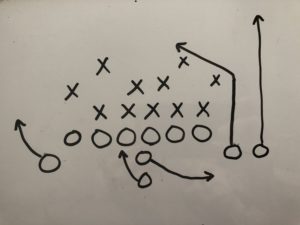
The current situation with COVID-19 pandemic has been unlike anything we have experienced previously. With sports seasons suspended, I began to think about some comparisons between the best sports coaches and the best leaders in the current environment of uncertainty.
Here are 8 things you can learn from the best sports coaches:
- Be willing to call an audible. The best coaches call audibles when their game plan is no longer working. Even though you may have prepared what you thought was a strong strategic plan, when circumstances change, recognize that it’s time to call an audible and change the plan. When external factors are changing this rapidly, you will likely need to implement changes quickly. Be willing to change the course and adapt.
- Know your players and the depth of your bench. Good coaches know the strengths of every player, even those who spend much of their time on the bench. Great players are hard to replace when they must come out of the game. The best coaches know the hidden strengths of all the players and can find the magic combination of players to overcome the loss of that one great player. A real-life example of this is if your production supervisor must stay home since schools are closed, who else can help identify and implement changes in efficiency and processes? If you know the hidden strengths of your team, you may recognize that your shipping clerk has created efficient processes in their department that indicate an innate strength that could be applied to other areas of the business.
- Recognize that losing one game does not mean the season is over. The best coaches help their teams get over the loss as soon as possible in order to focus on the next game and the long-term vision for the season. They inspire confidence in their players and motivate them to think positively. As painful as it may be in the short term, recognize that the current challenges we are facing may just be a blip in the long season of your business. Do your best to get through it, understanding that there may be some short-term, painful losses along the way. If you can keep your team focused on your long-term vision, you are likely to succeed in the long term.
- Believe in yourself. The best coaches believe in themselves and have the confidence that they can overcome adversity. That type of confidence is contagious – the players can feel it. Even when the players start to doubt their own abilities, the best coaches overcome that doubt by inspiring confidence and showing that they believe in their team. And we learn the most about ourselves and our teams when we face adversity.
- Remain calm. In my opinion, the best coaches remain calm in tough times. Even when games become emotional, if the coach keeps his or her own emotions in check, he or she is often able to get the team to refocus on what they need to do. Think about it – if you are in a critical situation, who do you want to follow? A leader who is frantic and crazed, upset and out of control? Or one who is calm and using the highest functioning portion of their brain because they are not in “fight or flight” mode? If you tend to become emotional under stress, then self-care is important. Getting enough exercise and sleep, eating healthy, and using mindfulness practices can help, even in small doses.
- Seek input from your best players. The best coaches trust their team leaders to provide input on what could be done differently. As leaders, we don’t have to have all the answers. Our job is to hire the best and allow them to help us lead more effectively. They will likely see things differently in the middle of the game than we see from the sidelines, and that perspective can be invaluable when making decisions.
- Focus on opportunities. The best coaches watch for mismatches between the teams, then take advantage of the opportunities that appear in the moment. For example, if you have been struggling to hire workers for the second shift, perhaps now is the time to seek out those who worked at the bars that are now closed. If you have unused trucks, could they be leased to companies who are struggling to keep grocery stores stocked? Is now an opportunity to partner with a competitor, or to make that acquisition that would enable you to provide a more comprehensive service to your customers?
- Think about next season. When things are not going as well as planned for the current season, the best coaches start to think ahead to the next season. Internally, where are the gaps in talent on the team? Which players are just not a good fit with the current game plan or culture? Do some players just need a bit more development in order to reach their full potential? Externally, will any rules of the game change next season? How might your industry be different when the pandemic has ended? Will your products and services still be relevant? How can you be less reliant on one supply chain? How can you handle more work virtually?
What other attributes have you observed in the best sports coaches that could be applied during this time of uncertainty?
